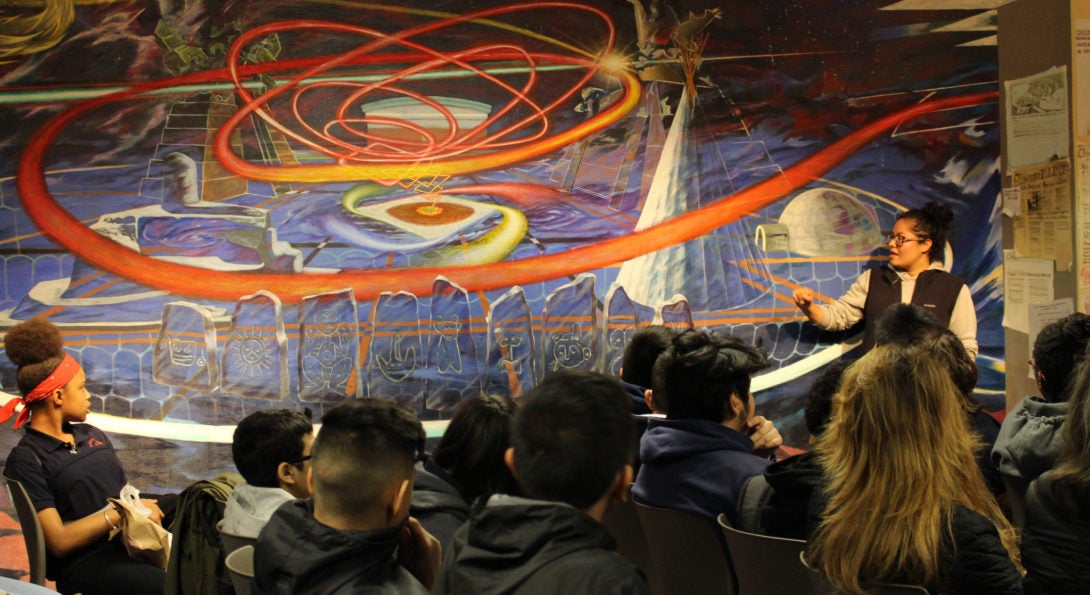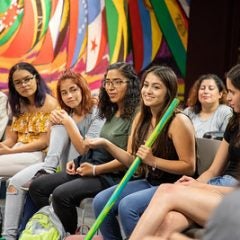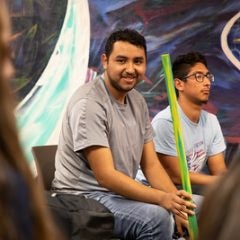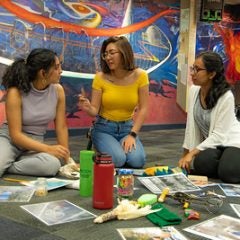LCC Dialogues and Mural Tours

Introduction
The UIC Latino Cultural Center offers the Dialogues and Mural Tours Initiative using the power of art to collectively explore creative solutions for common challenges. Public art allows for a diversity of people to share their stories, concerns, and radical visions for a just future; and the LCC’s mural—El Despertar de las Américas (The Awakening of the Americas)—is a tool for doing this.
Connecting Environmental and Social Justice Dialogues focus on environmental justice and its connection to im/migration, labor, and health (including COVID-19). Participants will discuss the disproportionate impact of environmental harms and systemic inequities on BIPOC communities. By facilitating group discussions using creative tools, students explore these connections and how their field of study and future careers can advance sustainable environmental and social justice practices. Through this dialogue, they also engage in self-reflection and consider how their cultural and personal assets can be harnessed to create community solutions and collective action.
Dialogue sessions are held in the LCC gallery for 50 min. or 90 min. and can hold up to 30 participants. Larger groups can be split into multiple dialogue sessions.
LCC Mural Tours serve to introduce the LCC mural to visitors, intertwining artistic interpretation with historic tales of our campus community and linking these to contemporary life.
Mural Tour sessions are in the LCC gallery for 50 in. and can hold up to 30 participants. Larger groups can be split into multiple tour sessions.
In-Person Heritage Garden Tours – Not available until June 2025
- The Heritage Garden is a hands-on learning project facilitated by the seven campus cultural centers (CCUSC), sponsored by the UIC Sustainability Fee. Join the student gardeners on this 50-minute exploration of the campus satellite gardens, including the Monarch Habitat, to learn diverse cultural stories linking environmental and social justice issues. Participants will also explore the Social & Environmental Pollinators Installation, a series of ten former ash urns painted by local Latinxs in Fall 2016 as part of the LCC’s 40th anniversary celebration.
Schedule here! Dialogues & Tours Reservation Form
LCC Mural Tours
- Self-Guided Virtual Mural Tour for Asynchronous classes – This pre-taped, 12 minute tour incorporates a series of questions to incite critical thinking and have students write a short response paper if instructors wish to assign this. The tour is accessible by completing the form below.
Request here! Self-Guided Virtual Mural Tour Form
Watch and read how the LCC civic dialogues and tours support student learning and their college journey at UIC
Testimonials

“US 130 students are now aware of LCC and the ECJ dialogues, they can connect course content materials in unique ways and also find personal connections to the dialogues, which research has shown has the greatest impact for change in attitudes, perspectives and behavior. Given the large class size (75 students) the smaller groups allow students to connect to students in the class that they may not otherwise communicate with during the semester.
We bring the LCC visit and ECJ dialogues up throughout the course time to make sure that the materials and learning objectives are reinforced and students gain additional insights from the ECJ dialogues with regard to the course materials. They are encouraged to bring their experiences up in class and during the online discussion days.
Overall, I highly recommend finding ways to integrate the ECJ dialogues in UIC course materials so that students get extra exposure to not only the content of the dialogues but also the amazing resource that LCC is for UIC students”.
| Adjunct Assistant Professor, UIC Urban Planning & Policy

I will certainly take away the fact that different talents and skills of individuals can be used to inform & influence people about environmental issues.
| Urban Sustainability 130

This discussion helped me realize how sustainable practices may already be a part of our/some cultural practices.
| Urban Sustainability 130